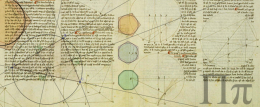The study of mathematics as text is a growing area of academic inquiry. Credit: Anna Cobb
Like novelists, mathematicians are creative authors. With diagrams, symbolism, metaphor, double entendre and elements of surprise, a good proof reads like a good story.
Reviel Netz, a professor of classics and, by courtesy, of philosophy, is especially interested in exploring the literary dimensions of the textual artifacts left by the likes of Archimedes and Euclid. Netz, one of the world's preeminent experts on the works of Archimedes, sees proofs as narratives that lead the reader turn by turn through an unfolding story that ends with a mathematical solution.
In his book Ludic Proof: Greek Mathematics and the Alexandrian Aesthetic, Netz reveals the stunning stylistic similarities between Hellenistic poetry and mathematical texts from the same era.
Earlier this spring, Netz and other scholars engaged in the study of mathematics as text gathered at Stanford to discuss this growing area of academic inquiry.
How did you become interested in exploring the idea of mathematics as literature?
I was always interested in the ways in which mathematics – or science in general – is concretely experienced: not the abstract logic of it but the heartbeat-by-heartbeat sense of getting the piece of knowledge through one's eyes, hands, thoughts. This gives rise very naturally to the thought of thinking of the taking-in of a mathematical text alongside the taking-in of a text in general, which is something literary scholars are sometimes interested in.
You have said that a math proof is more focused on the properties of text than any other human endeavor, short of poetry.
Mathematics is structured around texts – proofs – that have very rich protocols in terms of their textual arrangement, whether in the use of extra-verbal elements – diagrams – in the very layout, in the use of a particular formulaic language, in the structuring of the text. And its success or failure depends entirely on features residing in the text itself. It is really an activity very powerfully concentrated around the manipulation of written documents, more perhaps than anywhere else in science, and comparable, then, to modern poetry.
Can parallels be drawn between pre-modern mathematics and pre-modern literature?
Of course, and my book Ludic Proof: Greek Mathematics and the Alexandrian Aesthetic is precisely about the manner in which surprise, remarkable juxtapositions and the hybridization of genres are key norms for both mathematics and poetry in the culture of the Hellenistic Mediterranean.
How does an aesthetic examination of a mathematical text differ from studying the mathematical information?
When you study the information, you may translate the contents to whichever form suits you and consider its validity, axiomatic underpinning, etc; when you study its aesthetics, you must remain focused on the text as perceived historically.
How do you define or identify literary-like elements like metaphors in a mathematical proof?
Metaphor is fairly standard in mathematics. Mathematics can only become truly interesting and original when it involves the operation of seeing something as something else – a pair of similarly looking triangles, say, as a site for an abstract proportion; a diagonal crossing through the set of all real numbers.
You have said that a proof can be seen as having a complex narrative and even elements of surprise much like how a story unfolds. Can you give me an example?
You tell me, "I'm going to find the volume of a sphere." And then you do nothing of the kind, going instead through an array of unrelated results – a cone here, a funny polygon there, various proportion results and general problems; then you make a thought experiment that shows how a sphere is like a series of cones produced from a certain funny polygon and, lo and behold, all the results do allow one a very quick determination of the volume of the sphere. Here is surprise and narrative. That's Archimedes' "Sphere and Cylinder" proof; it's a typical mechanism in his works. Other authors are often much more sedate and progress in a more stately manner; this is Euclid's approach.
Why is there a growing interest in studying the "aesthetic dimension of human endeavor," and why is this a valuable course of study, especially in relation to mathematics?
There is an interest in the embodied experience of various fields, which gives rise to an interest in aesthetic. The unfortunate thing is that many scholars who study culture share this feeling but instead of actually engaging in the study of the aesthetic of a given culture – which would mean, essentially, a study of the formal properties of a historically situated group of artifacts – they engage in the ideas people had about aesthetics.
Would you say there is an art to being a mathematician?
Yes, it's a cliché really, nothing I came up with. Mathematicians are always intensely aware of the aesthetic dimension of their own craft. I basically just try to say this is no mere waxing lyrical, there's a concrete reality that needs to be studied.
Provided by Stanford University





















